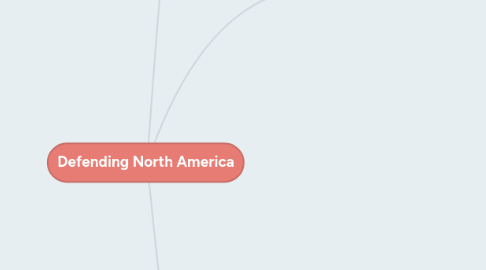
1. Canada's Role in the Cuban Missile Crisis
1.1. For
1.1.1. Diefenbaker defended Canada's independence by refusing to help the U.S at first. The U.S had a large influence in Canadian politics, economy, and culture since the 1920's. This Canada's chance to distance itself from U.S affairs.
1.1.2. Diefenbaker took reasonable precaution before getting involved. He was skeptical of U.S photographs because he did not want to support an issue that may be potentially wrong.
1.1.3. The Cold War conflict is a struggle primarily between the Soviet Union and United States. Despite being a NORAD member, Canada only joined to serve its own interests on security. Canada does not wanted immerse itself in U.S affairs.
1.1.4. The Canadian government was concerned that placing its military on alert might provoke the Soviet Union.
1.2. Against
1.2.1. Canada-US relations were further strained. Diefenbaker and Kennedy already disliked each other. When the crisis arose, the U.S expected unconditional support from its closet ally, Canada. When Canada refused to do so, the U.S felt betrayed.
1.2.2. Canada was drawn into a conflict that seemed largely rooted in U.S policy and intersts.
1.2.3. Even though Diefenbaker was defending Canada's independence, a poll later showed that 80% of the Canadian population disagreed with his initial action of refusing to help the U.S at first. ,
1.2.4. Presence of the bases for intermediate ballistic missiles on Cuba is a direct and immediate threat to the security of North America and that Canada is in a position of being directly threatened as a result. Canada should therefore take immediate action to protect North America's security.
2. The Scrapping of Avro Arrow
2.1. For
2.1.1. The Arrow cost 6x more to produce than its American counterpart. The Canadian Air force did not even want to buy it. It was spending tax payers money on something that may not be as useful as it seemed to be.
2.1.2. The scrapping was attributed to Royal Canadian Mounted Police fears that a Soviet "mole" had infiltrated Avro, later confirmed to some degree in the Mitrokhin archives. If the Arrow had continued to develop, the Soviets could have stolen even more confidential information from Canada.
2.1.3. Rumours had circulated that Air Marshal W. A. Curtis, a First World War ace who headed Avro, had ignored Diefenbaker and spirited one of the Arrows away to be saved for posterity. These rumours were given life in a 1968 interview, when Curtis was asked point-blank if the rumour was true. He replied: "I don't want to answer that."
2.1.4. The Avro Arrow may have been significantly faster than other aircraft at the time however, this role is largely obsolete these days as modern jets are already fast enough and other weaponry like surface-to-air missiles provide better defence.
2.2. Against
2.2.1. The Arrow is considered to have been an advanced technical and aerodynamic achievement for the Canadian aviation industry. Scrapping the Arrow could have stunted further major advancements in Canadian aviation. In retrospect, the Canadians had lost an opportunity to establish their country as a technological leader.
2.2.2. Historians have argued that the Scrapping of the Arrow was a American conspiracy because Americans at the time, did not have a weapon as grand as the Arrow.
2.2.3. The Soviets posed a threat to North American security during the cold war. The CF-105 (as the Arrow was officially known) was originally designed as a long-range interceptor, meant to meet and destroy Soviet bombers. The arrow could have averted a potential crisis if the Soviet decided to bomb North America.
2.2.4. On October 4, 1957 – the same day as the first Avro Arrow rolled off the production line – the Soviets launched the satellite Sputnik, becoming the first nation to put a man-made object into orbit. This made it looked like Canada was being defeated in an arms race.
2.2.5. The development of the Avro Arrow changed the focus for militaries on both sides of the Cold War, away from conventional bombers and towards atmospheric weapons like intercontinental ballistic missiles.
3. Canada's Acceptance of Nuclear Weapons
3.1. For
3.1.1. The U.S Bormarc was capable of carrying nuclear warheads that could have defended Canada from imminent threats from enemy countries.
3.1.2. Politically speaking, if Canada hadn't accepted the nuclear weapons, it could have injured trade and investments from United States, causing major economic damage.
3.1.3. If Diefenbaker had refused to accept the nuclear weapons, it could have been viewed as an anti-American act. The Liberals were already criticizing Diefenbaker for his nationalism, and in 1963 Diefenbaker lost his chance to get re-elected
3.1.4. In 1963, Liberal Leader of the Opposition, Lester B. Pearson declared his support of acquiring nuclear weapons in order to meet the obligations of Canada’s NATO and NORAD agreements. Pearson expressed his misgivings over the defense role that Canada had agreed to play but stated that until Canada’s defense policy changed, a Liberal government would not evade its commitments.
3.2. Against
3.2.1. Carrying nuclear weapons could have amounted to global suicide. As it heightened the nuclear arms race between both sides. If any of these weapons were to be used, it could have led to total annihilation of humanity.
3.2.2. The minister of external affairs argued that it was hypocritical for Canada to carry nuclear weapons when the Canada had already urged the United Nations to work for disarmament.
3.2.3. Acceptance of American nuclear weapons conveyed to the world that Canada had a strong dependancy and reliance on its neighbor, the United States. This is particularly bad as Canada has already worked hard to establish itself as a unique and independent nation.
3.2.4. Regardless of accepting or not accepting the nuclear weapons Canadian and American relations were already strained because of Canada's initial reluctance to accept the American nuclear weapons. Accepting the nuclear weapons did not significantly improve Canada-US relations because of Canada's precautious attitude towards the Americans.
